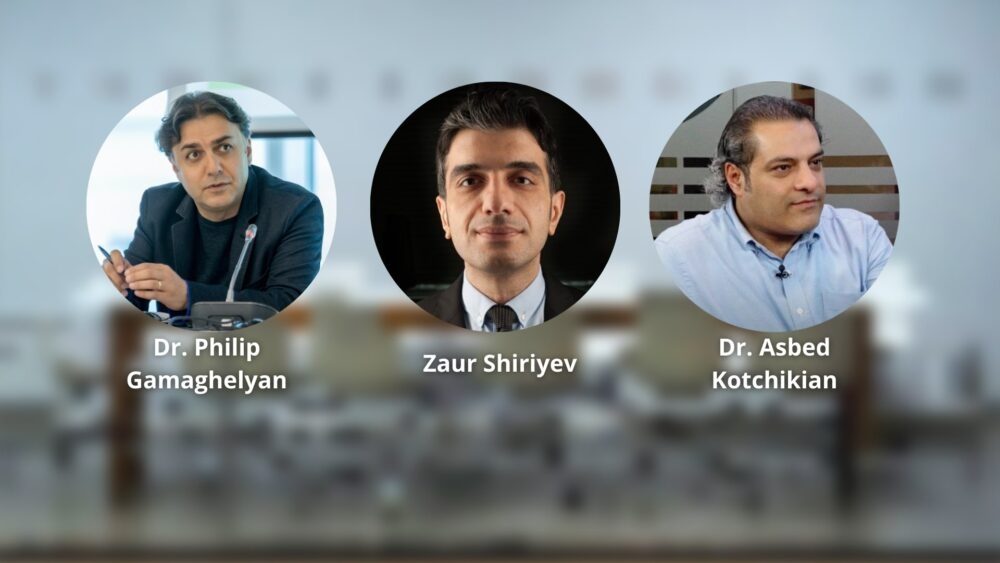
Armenia held snap parliamentary elections on June 20, 2021. On June 29, Asbed Kotchikian, Caucasus Edition Advisory Board Member and Associate Professor of Political Science at AUA, and Zaur Shiriyev, South Caucasus Analyst at International Crisis Group and former Academy Associate with the Russia and Eurasia Programme at Chatham House, joined Caucasus Edition’s webinar “Post-election Armenia: envisioning the future of Armenian-Azerbaijani relations.” Philip Gamaghelyan, Editor at Caucasus Edition and Assistant Professor at the Kroc School of Peace Studies, University of San Diego, moderated the discussion.
According to Kotchikian the results of the elections showed that economic concerns and other internal factors have taken priority. He stated, “Karabakh is not a major factor in the minds of the Armenian electorate. The war itself was a trigger for the elections but it was not in the minds of electors”. Kotchikian argued that this had been the case since the 2003 elections, when the Karabakh conflict became a secondary issue, after which time emphasis in all political platforms was focused on economic growth.
Shiriyev suggested that in Azerbaijan, the Armenian snap elections were perceived as a referendum on peace or war. Pashinyan was perceived to be the peace candidate and his main rivals – the war candidates. Kotchikian concurred that in both societies Pashinyan’s main rival, former president Robert Kocharyan, embodies the image of a pro-war politician, as he was one of the main opponents of Levon Ter-Petrosyan’s pro-normalisation agenda in 1998.
Shiriyev further argued that within Azerbaijan, the government of Armenia is no longer perceived as a party to the Karabakh conflict. The perception of Pashinyan as a peace party candidate concerns the relations between Armenia and Azerbaijan. Shiriyev continued that Baku will be interesting in finding a format to engage with Karabakh Armenians, but without a political, formal process.
Regarding possible Armenian foreign relations strategies, Kotchikian expects to see Pashinyan prioritizing cadre loyalty over professionalism, continuing to govern single-handedly without relying on institutions and while lacking a discernable strategy. This trend, apparent in the run-up to the war and the elections, is likely to intensify considering the high-profile resignations from the Foreign Affairs Ministry, absence of professionals willing to work with Pashinyan, and his inability to work with anyone except his inner circle. Kotchikian concludes, “Armenia lacks the hardware and the software to conduct foreign policy in terms of Karabakh as well as in terms of ensuring Armenia’s security.”
Gamaghelyan raised a question about misplaced expectations. After ascending to power in 2018, Pashinyan was seen as a pro-peace leader in Azerbaijan. This created an expectation that Armenia would be open to compromise, which was not the case. Meanwhile in Armenia, Azerbaijani leadership was perceived to be a collection of pro-war actors. Aliyev’s attempts to de-escalate in 2018-2019 were neither accepted nor believed. Currently the trend continues. Pashinyan is once again seen as a pro-peace actor in Azerbaijan, while in Armenia Aliyev is seen as a pro-war actor; only his aggressive messages receive coverage there.
Kotchikian emphasized that the only leader who espoused an openly pro-peace platform in Armenia was Ter-Petrosyan, yet his party did not attract a significant amount of votes. The contradictory messages coming out of Baku do not help the normalization cause either. Considering that even openly conciliatory messages in 2018 did not reach the Armenian leadership nor public, the current ones are even less likely to lead to de-escalation.
According to Shiriyev, the current priorities for the Azerbaijani government are rebuilding the territories in and around Nagorno-Karabakh and the return of the displaced. Re-establishing the peace process and searching for a final political solution are of secondary importance in the near-term perspective.
Both Shiriyev and Kotchikian saw a need to change the focus of peacebuilding efforts. The need for Track 1.5 and 2 activities have greatly diminished. Yet with Armenian and Azerbaijani populations poised to live in close proximity and communication routes opening up, there will be a need for both grassroots level communication and to address mundane challenges such as water sharing. Addressing humanitarian issues with support from international community, particularly the return of detainees and demining, should also take priority.